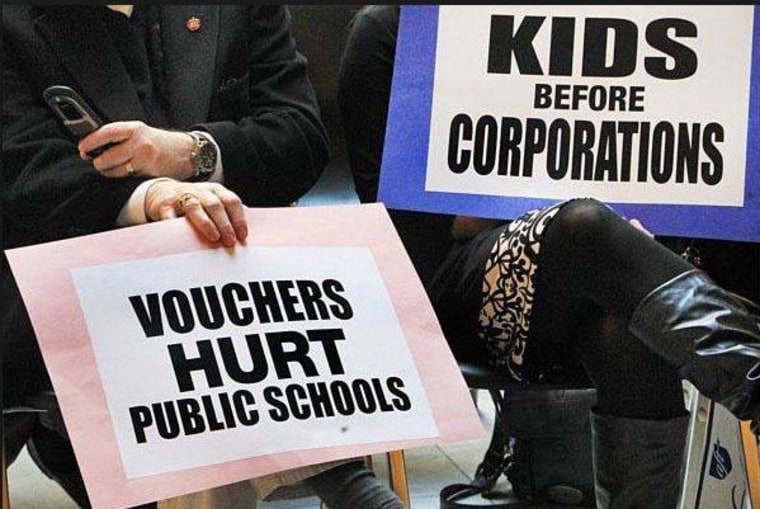A few months ago, following a lengthy "autopsy," the Republican National Committee unveiled a lengthy blueprint for the party's recovery, and though there wasn't much in the way of policy prescriptions, there was one issue the document mentioned three times: "school choice."
"School choice," a poll-test euphemism for private school vouchers, is generally characterized by GOP leaders as a way for Republicans to reach out to minority communities, position themselves as caring about domestic policy, and weaken labor unions, all at the same time. According to the Washington Times, the party is apparently taking the idea quite seriously.
A Republican Party still reeling from the November elections is hoping that advocating for school choice can help the GOP recapture moderate voters, arguing that the issue provides a natural link between their limited-government philosophy and the average voter's desire for good local schools.Sen. Rand Paul, a Kentucky Republican speaking to grass-roots activists in Concord last week, said the party can bolster its national image by making school choice -- giving parents the ability and the funds to choose between competing public and private schools for their children -- a more prominent part of its message.Louisiana Gov. Bobby Jindal hit a similar note two weeks earlier, saying at a fundraiser in Manchester that the issue is a political winner because it saves money and produces better results.
The policy is also being touted by Wisconsin Gov. Scott Walker (R) and New Jersey Gov. Chris Christie (R), among others.
I can appreciate the appeal among Republican policymakers, who generally don't have much of a policy agenda to speak of. By pushing vouchers, GOP officials and candidates get to pander to social conservatives and satisfy the party's libertarian wing, all while infuriating teachers' unions. That the idea ostensibly gives Republicans a "compassionate conservative" veneer is gravy.
So why haven't we heard more about this lately? Largely because vouchers aren't the political panacea the GOP has been waiting for.
For one thing, there are serious constitutional concerns, as Jindal was recently reminded when his state Supreme Court scrapped his in-state voucher scheme.
Indeed, as we discussed last year, all of problems that have plagued vouchers for years haven't gone away -- if you're familiar with the larger debate, you'll recall serious concerns over public funding of religion; leaving behind students in sub-par schools; and giving tax dollars to unaccountable private operations, many of which have little to no standards for quality education.
What's more, there's very little evidence that vouchers actually help students in any measurable way, despite many years of research.
And while we're at it, let's also note that Republicans are convinced this is a political winner for them, but there's no evidence to support that, either -- vouchers have polled poorly for many years; they've failed repeatedly when put on statewide ballots; and though Mitt Romney endorsed vouchers last year, he was generally afraid to talk about his position, probably because he didn't want to deal with the political opposition.
The fact remains that conservatives have talked about vouchers and privatizing education for several decades now, and it's never been a political winner for the right. There's no reason to believe this new push will be any more successful than the previous ones.
